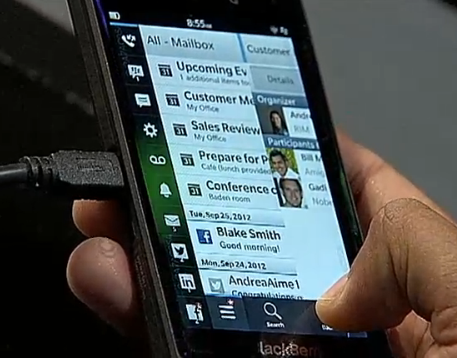RIM's BlackBerry 10: Why I still believe

Research in Motion's BlackBerry Jam in San Jose could either be considered the rebirth of a company or a last gasp attempt to keep developers interested in the platform. There's not much in between.
Given that binary reality---BlackBerry 10 either does well or RIM dies---it's worth checking in on both sides of the equation. Watching RIM CEO Thorsten Heins talk all things BlackBerry 10, which will be tested by carriers in October, I couldn't help but root for RIM. Yes, I realize RIM faces long odds, but we all love a comeback story and frankly I'm tired of the Apple iOS and Google Android race. I'm obviously a sucker for a comeback---I'm even rooting for MySpace's redesign.

RIM also won me with another key message: I'm tired of that damn app screen too. Heins talked about BlackBerry Peek, which allows you to check in on apps such as Facebook without actually launching the app. Rachel King noted that BlackBerry 10 looks like the offspring of an Android and Microsoft Windows Phone one-night stand gone awry. Quip aside, that hybrid bastard child of a mobile OS could actually work because it's different yet not jarring. Technically, King wrote that BlackBerry 10 looks "a bit like Windows Phone 7 and Android had a kid of their own." I injected a little poetic pub license.
More: RIM banking on BlackBerry Balance, HTML5, BYOD trend | CNET: BlackBerry 10 OS: A closer look at messenger, navigation | Techmeme | RIM's BlackBerry 10 master plan: Bridge personal, work personas
Heins and his merry band of developer liaisons asked developers to believe. RIM even backed up that message with a horrible REO Speedwagon spoof. That REO Speedwagon number should have been the first reason to just shut RIM down.
But even with those jump the shark moments I still believe a bit. Here's why:
RIM has a subscriber base of 80 million. It's hard to believe given RIM's horrible quarters of late, but the company has a global installed base of enterprises and consumers. We can debate whether RIM can hold onto that user base, but an upsell is easier than trying to win back customers that already fled.
Developers are being paid better (assuming RIM does well). RIM executives noted that developers will have a better revenue split and spend less upfront to build apps. The pitch: Bring any code you want and it'll port to BlackBerry 10. Sure, BlackBerry 10 could resemble a Frankenphone, but RIM has lowered the barrier to entry for developers.
You won't be embarrassed by BlackBerry 10. On the train into New York City, RIM's standing is so low that people with BlackBerry devices get dirty looks. These people are relics. Let's assume these BlackBerry users upgrade to BlackBerry 10. They'll have an OS that continues to integrate messaging well, toggles apps seamlessly and enables people to do a lot of tasks with one hand in an airport. Double bonus is that you can message in English, French and Spanish in the same conversation. RIM's global user base will appreciate such perks. The ability to make every notification meaningful and avoid the dreaded app icon layout means "there's no more application grid and no in and out," said Heins. RIM also noted that the popular social apps will be native on BlackBerry 10.
RIM still gets the enterprise. RIM is losing its enterprise installed base, but CIOs don't like the trend all that much. As our recent CIO Jury highlighted, tech leaders want a platform that isn't iOS or Android. The enterprise play is open for Windows Phone or RIM, but probably not both. Heins has positioned RIM software and BlackBerry 10's ability to keep work and personal profiles separate as a handy way to manage bring your own device efforts. RIM's ability to woo CIOs with multiple device management software also isn't a stretch.
Carriers want a No. 3 platform and smartphone diversity. Heins said that carriers have committed to pushing BlackBerry 10 and have noted that the platform is "beyond their expectations." Of course, Heins' assertion may only mean that carriers weren't expecting much. Nevertheless, carriers are rooting for RIM as well as Microsoft. Telecoms don't want an Apple-Android duopoly.
Add it up and RIM has a puncher's chance as long as it can effectively launch in the first quarter of 2013. Next up, RIM has to show that its financial health has stabilized in what's expected to be a horrid quarterly report Thursday.